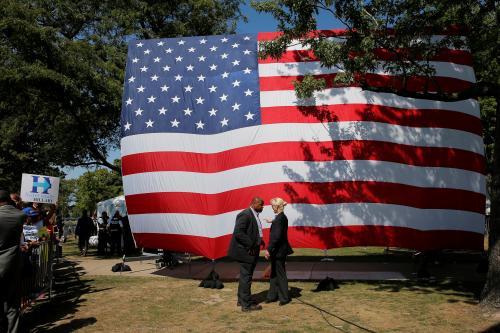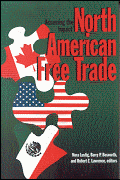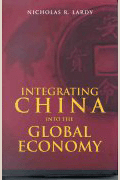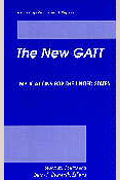This commentary originally appeared in The Hill on July 12, 2017.
The Hamburg G-20 Summit may best be remembered for how isolated the United States was on issues such as climate and trade, a sharp contrast to the stance taken by previous Republican and Democratic administrations. The tortured language on trade in the G-20 Leaders’ Declaration glosses over significant differences between most other G-20 leaders and President Trump.
Resisting protectionism
Typically, trade issues played second fiddle to financial and monetary concerns in the G-20 arena, in part because of the group’s original focus on tackling the fallout from the global financial crisis, when what mattered on the trade front was a commitment to a standstill and rollback of protectionist measures. Indeed, as recently as the 2016 G-20 meeting, this remained a central trade outcome.
Over the past 10-plus years, the U.S. labored to negotiate comprehensive, high-standard trade agreements with Asia — the Trans-Pacific Partnership (TPP) — and Europe. The G-20 adapted to this by focusing on ensuring that such efforts supported the multilateral trade system at the World Trade Organization (WTO).
That the G-20 discussion on trade would be more prominent and difficult this year was clear from the beginning of the Trump presidency. The stiff headwinds facing free trade got stronger when Trump withdrew the U.S. from the TPP — the 12-country trade deal commenced by President G.W. Bush and signed by President Obama. Trump has also threatened to pull the U.S. out every other trade agreement, from the North American Free Trade Agreement (NAFTA) to the WTO, and to impose tariffs on steel imports in particular.
Trade practices of other countries that disadvantage the U.S. are clearly an abiding concern shared by Trump and his senior economic officials, and they also preoccupied most previous U.S. presidents. For instance, steel overcapacity, a focus for the current administration and in which the G-20 statement included strong language and commitments to action, was discussed at the G-20 in previous years.
In fact, the G-20 language on steel overcapacity is the most promising development in the trade realm, not only because it could be the basis for an effective approach to this challenge, but because it is the one example of the administration working constructively with other countries to address an international trade issue.
Yet it is Trump’s deep skepticism about trade that permeates this year’s G-20 statement. For instance, he refused to recommit to the annual G-20 embrace of a standstill and rollback of protectionist measures. While the G-20 leaders acknowledged the need to keep markets open, without any yardstick as to what constitutes openness, such an exhortation, is largely meaningless.
A G-20 “promise to fight protectionism including all unfair trade practices and recognize the role of legitimate trade defense instruments in this regard” is noteworthy. The claim of unfair trade practices has been a rallying cry for those opposing trade liberalization from the political left and the right. The problem with including such a reference in the declaration is that, unless “unfair trade practices” are defined by agreed upon trade rules, the reference serves as a catch-all for whatever other countries do that affect trade.
”The role of legitimate defense instruments” introduces confusion as well and was likely included at the insistence of the United States. Trade rules under the WTO and all other trade agreements to which the U.S. and other countries are a party include mechanisms — legitimate trade defense instruments, if you will — that allow governments to protect domestic industry from harm caused by dumped or subsidized imports.
There is also scope under the trade rules to discriminate against imports based on a range of public policy goals, including to protect human health and the environment and to safeguard national security. Thus, one of the sole reasons for citing “the role of legitimate trade defense instruments” may be to signal an assertive intent to increase the use of such available measures.
Sharing the benefits of trade
Importantly, the G-20 this year includes recognition that the benefits from globalization need to be more widely shared, noting the importance of appropriate domestic policies. This includes “the need to educate and train people with the necessary skills for the future of work” and “the important role of vocational education and training.”
These G-20 observations get to a key U.S. challenge — how to help those affected by declining manufacturing jobs. Manufacturing job losses have only partly been caused by trade, with most of the job losses arising from technology and productivity gains. Developing more effective labor market policies could help U.S. workers adjust. Yet the Trump budget, if enacted, would instead gut many of the education and training programs needed to help people adjust and find jobs elsewhere.
The World Trade Organization
Compared to past G-20 declarations, references to the role of the WTO were sparse. That said, there was agreement “to further improve the functioning of the WTO,” including its negotiating and dispute settlement mechanisms. U.S. Trade Representative Robert Lighthizer was only confirmed last month, which suggests the U.S. needs more time to fully articulate its stance vis-a-vis the WTO, ideally ahead of the WTO Ministerial in Buenos Aires in December.
The G-20 statement did include a specific mention of the importance of the WTO’s work on e-commerce. Yet, without progress on outstanding Doha Development Agenda issues, such as agriculture, it is difficult to see the WTO making progress in areas of importance for the U.S.
Conclusion
Given Trump’s actions and rhetoric so far, the G-20 Leaders Declaration on trade could have been worse, reflecting a carefully negotiated outcome and deft handling by German Chancellor Angela Merkel.
While the carefully constructed ambiguity in the text gives each G-20 leader something to be pleased about, the reference to unfair trade practices is of particular concern if it decouples assessments of what is fair from any legal norm and leaves such judgments up to each country to decide. This may be something the U.S. administration wants, but risks other countries doing the same.
The Brookings Institution is committed to quality, independence, and impact.
We are supported by a diverse array of funders. In line with our values and policies, each Brookings publication represents the sole views of its author(s).










Commentary
Op-edG-20’s tortured trade language a step backward for free markets
July 12, 2017